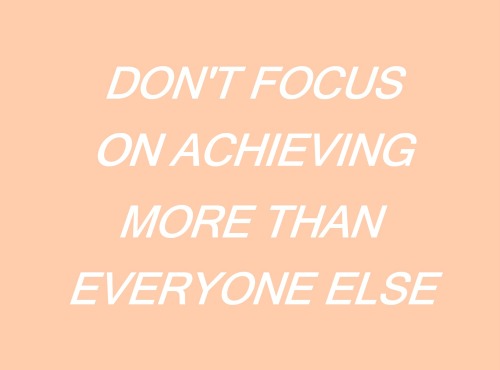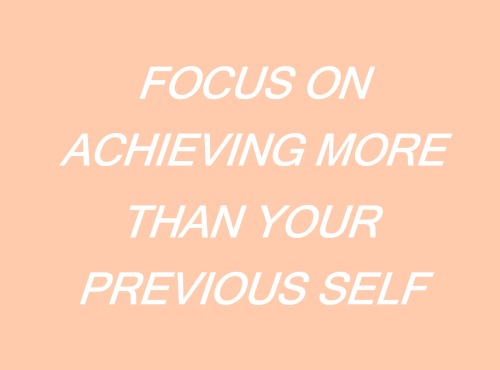Concentrate On Becoming Your Best Self Rather Than Trying To Be Somebody Else


concentrate on becoming your best self rather than trying to be somebody else
More Posts from Programmingravenclaw and Others
kids, when you’re choosing your college schedule, you’ll hear a voice saying “just take the 8AM class. it won’t be that bad. you’ve done it for this long” that’s the devil talking

hey hey hey everyone!! as a self-proclaimed mathlete & absolute math nerd, i figured i could share some quick little tips for such an amazing subject! soooo here you go:
practice, practice, practice!!
I always say that practice is the most essential aspect of studying & learning math- and many other subjects! This can take the form of homework (mini tip: always do your homework if you are able!!! it’s only to your benefit! even if it’s not for a grade, try your best to work on it anyway), practice problems from a textbook or workbook, old questions from a past quiz or test, etc. Even just a couple of practice problems every day, or some quick q’s before a test, can help a lot. Remember, repetition is a key form of revision!
take active notes
Math is a very active subject, so it’s important for your notes to reflect that. Basically, if you’re working on an example problem in the middle of your notes, write it down too. These problems can come back in quizzes or tests, and they really help reinforce material when you’re reviewing. Another way to keep your notes active is by drawing diagrams!! Diagrams can be essential for certain topics, so please don’t ignore them, even if you think you can remember what that graph looks like. Also, if you ever need to jot something down in the margins of your notes, do it! All of this will really help when you review.
know your calculator
Whether you need to know how to use one, or how to survive without one, calculators are pretty much always relevant when it comes to math. If the subject you’re learning allows it, you should always have a calc nearby, and you should know its basic functions. That doesn’t mean know how to add & subtract (unless that’s all that’s necessary for you), it means being able to work the graphing function, or how to enter data into your calculator for statistical evaluation, how to find certain functions in your calc, etc. It’s also very important to know how to work without your calculator. As you progress in math, there will be certain things that you just need to know how to do, because they take too long with a calc. Basically, make sure you understand what you’re doing with your calculator, so that you can understand how to do it without your calculator.
keep track of everything!
Math is a lot of data & different steps that you need to keep track of. When working on something, know where your numbers (or other forms of data) are, make sure you aren’t missing any! Do your best not to skip steps, even if you’re great at working in your head. Missing data & skipped steps are major sources of error and tiny mistakes that can mess up a whole problem. Also, know your common errors! Do you tend to skip a certain step because you think you’ve got it? Do you sometimes misinterpret graphs or data? Once you’ve figured that out, be extra careful with the specific problems that you have trouble with. Keeping track of your work & your mistakes can help you improve a lot!
memorize what needs to be memorized
A lot of math can be done with basic understanding of how to work a problem & the process to find a solution (these things are generally memorized with practice!) but there are some things that just need to be memorized. Whether it’s elementary functions like addition & division, or basic trigonometry, if it’s not a process you can learn through understanding, and need to know, make sure you know!! Some things can be memorized with practice, and others require different methods of memorization (I typically write & rewrite things multiple times). You can find some great posts on memorization here!
more masterposts!!
stem studying
study methods
precalculus
algebra
geometry
(ap) chemistry
ap world history
studyblr-ing
the everything book
the pomodoro method
how to use flashcards
how to use sticky notes
welcome to high school
tiny study spaces
what’s in a pencil case
i really love math & i wish everyone could see it like i do, so i hope this was helpful! keep shining like the star you are and don’t forget to be awesome today!!
- Aza
“Java got rid of multiple inheritance because it caused a lot of problems with performance” Well by that logic, java should just get rid of java.
6 Things I Learned From Studying For Exams in College
If you skip a topic or don’t study it thoroughly enough because you think it won’t be on the exam, it will be. Study that in particular so you won’t be surprised when it shows up as the first question. Unless your professor explicitly states that it won’t be on the exam, don’t skip any topics.
Put aside the content you’re comfortable and familiar with and start studying the things you don’t know. It’s hard and time consuming but that’s where the actual learning happens.
Start studying at least 4 days in advance. I always regret not starting earlier when I’m at the library 24 hours before the exam and not even close to being done. When I’m having trouble focusing, I’ll sit there and imagine myself an hour before the exam scrambling to finish up a topic, wishing that I had these extra few minutes, hours, or days that I have now. Take advantage of the time you have right now.
Changing up my location helps a lot when I’m studying. If I study in the same corner at the library, eventually my brain will start associating that spot with everything I do in that chair, including wasting time. For me, new location + new material = focus. A few location ideas: a quiet corner in the library, a noisy floor in the library, at your desk at home, a room with a view of the outdoors from high up, a bench/table outside, a cafe or brunch place.
Stay on top of studying and homework from day 1, not after syllabus week and not a month into the semester. When you submit a homework assignment, make it a point to 100% understand everything you just handed in. Homework is assigned for a reason; they’re meant as practice exercises for the material you learned and exams often mimic them. Once you hand in homework, you should know and understand the material. This saves you time when it’s finals week and you have old and new material to study.
Well before the exam, make a list of topics you don’t understand and get your questions answered. There have been so many times where I didn’t fully understand something and thought, “It’s okay, they’re probably not going to ask that,” and it shows up on the exam. When you get your question answered, branch out and ask things like, “What if it weren’t this particular situation/these particular numbers but a different one instead. How would you work through it this time?” (physics/math) or “What caused that/what came after that as a result?” (history). Try to understand all possible scenarios if you can.
Things Programmers Shout #698
“Okay, well that’s still an error but at least it’s a different error.” // submitted by @freedominfantasy

Scientists invented fabric that makes electricity from motion and sunlight. To create the fabric, researchers at Georgia Tech wove together solar cell fibers with materials that generate power from movement. It could be used in “tents, curtains, or wearable garments,” meaning we’d virtually never be without power. Source


Book of the week: Warrior of the Light by Paulo Coelho
Get the FREE Kindle Reading App
-
 imenknobarmo liked this · 1 year ago
imenknobarmo liked this · 1 year ago -
 unpoetik reblogged this · 3 years ago
unpoetik reblogged this · 3 years ago -
 gratefuldirtyhead reblogged this · 3 years ago
gratefuldirtyhead reblogged this · 3 years ago -
 iampyed reblogged this · 3 years ago
iampyed reblogged this · 3 years ago -
 iampyed liked this · 3 years ago
iampyed liked this · 3 years ago -
 weedtortoise reblogged this · 3 years ago
weedtortoise reblogged this · 3 years ago -
 imnotrevealingmyname liked this · 3 years ago
imnotrevealingmyname liked this · 3 years ago -
 burningpoison reblogged this · 3 years ago
burningpoison reblogged this · 3 years ago -
 aaterfoedelse liked this · 3 years ago
aaterfoedelse liked this · 3 years ago -
 meccatronica reblogged this · 4 years ago
meccatronica reblogged this · 4 years ago -
 dmystfy reblogged this · 4 years ago
dmystfy reblogged this · 4 years ago -
 hopenada liked this · 4 years ago
hopenada liked this · 4 years ago -
 lenisjourney liked this · 4 years ago
lenisjourney liked this · 4 years ago -
 anasophw reblogged this · 4 years ago
anasophw reblogged this · 4 years ago -
 jemmycardel reblogged this · 5 years ago
jemmycardel reblogged this · 5 years ago -
 wormystudies reblogged this · 5 years ago
wormystudies reblogged this · 5 years ago -
 luckycharm12 liked this · 5 years ago
luckycharm12 liked this · 5 years ago -
 achenlove liked this · 5 years ago
achenlove liked this · 5 years ago -
 theloveinkimkai reblogged this · 5 years ago
theloveinkimkai reblogged this · 5 years ago -
 savourygudetama liked this · 5 years ago
savourygudetama liked this · 5 years ago -
 romantisthubbyseo reblogged this · 5 years ago
romantisthubbyseo reblogged this · 5 years ago -
 romantisthubbyseo liked this · 5 years ago
romantisthubbyseo liked this · 5 years ago -
 luwoobae reblogged this · 5 years ago
luwoobae reblogged this · 5 years ago -
 luwoobae liked this · 5 years ago
luwoobae liked this · 5 years ago -
 peterporkpie liked this · 5 years ago
peterporkpie liked this · 5 years ago -
 accionoelle liked this · 5 years ago
accionoelle liked this · 5 years ago -
 wandachilda liked this · 5 years ago
wandachilda liked this · 5 years ago -
 hearts-burden reblogged this · 5 years ago
hearts-burden reblogged this · 5 years ago -
 mooncraving liked this · 5 years ago
mooncraving liked this · 5 years ago -
 studying-frlang liked this · 5 years ago
studying-frlang liked this · 5 years ago -
 aelinsolo reblogged this · 5 years ago
aelinsolo reblogged this · 5 years ago -
 aelinsolo liked this · 5 years ago
aelinsolo liked this · 5 years ago -
 agameofstarks reblogged this · 5 years ago
agameofstarks reblogged this · 5 years ago -
 theloveinkimkai liked this · 5 years ago
theloveinkimkai liked this · 5 years ago -
 smiling-yuta reblogged this · 5 years ago
smiling-yuta reblogged this · 5 years ago
Full-time Computer Science student, reader, and gamer with a comics addiction.
121 posts
